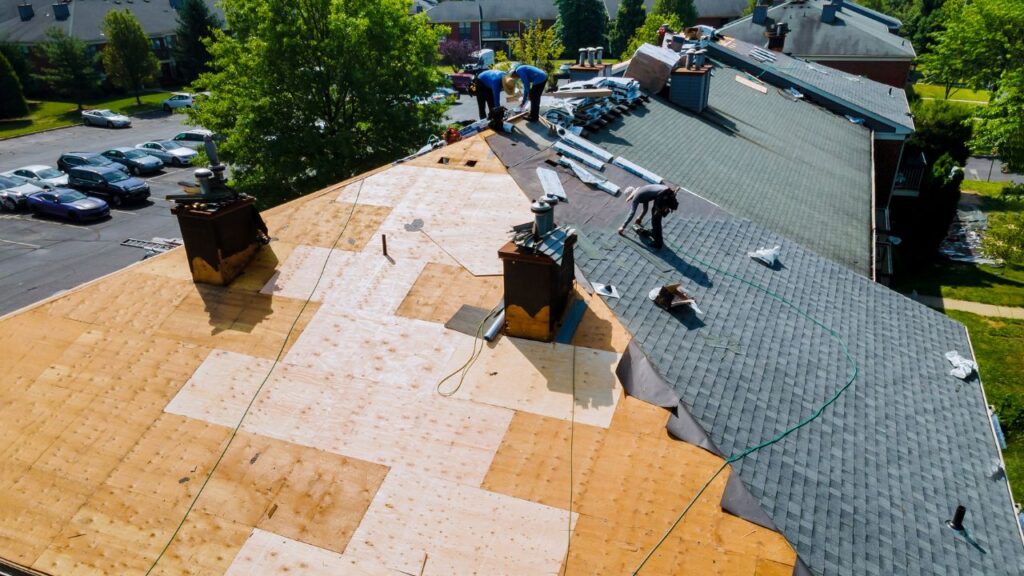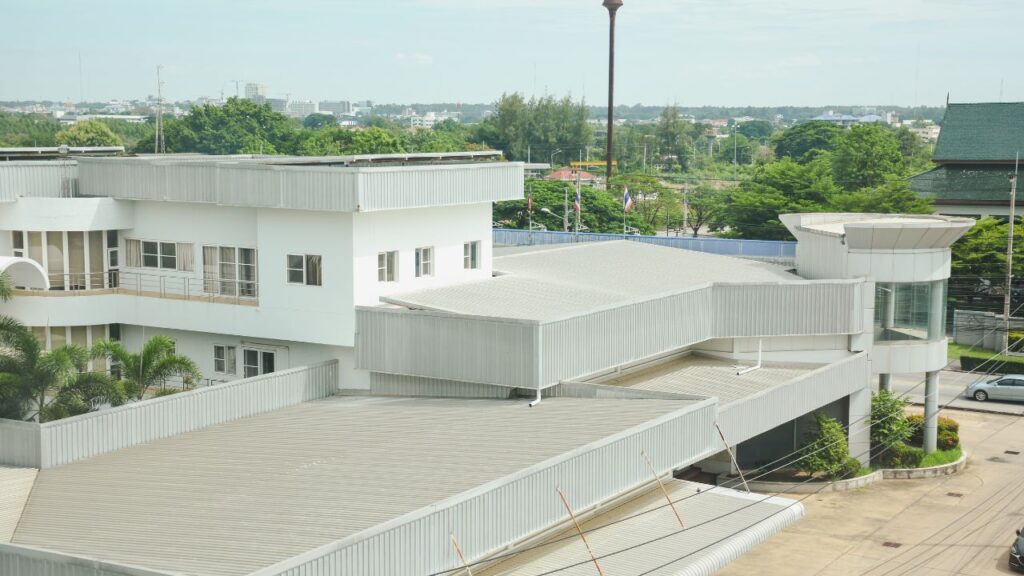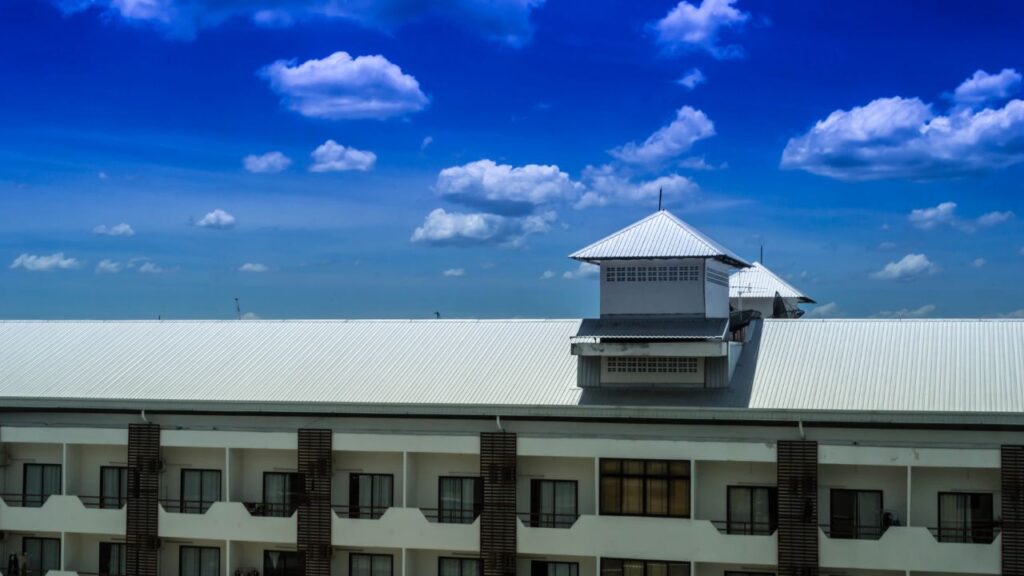Boost Your Roof Bids – Request a Precision Estimate!
- Accurancy
- Efficiency
- Transparency
- Customization
- Time Saving
- Professionalism
- Cost Control

Within the domain of hotel maintenance and enhancement, a crucial aspect involves comprehending the financial aspects linked to roofing projects. This understanding is imperative for adept budgeting and strategic planning. This article delves into the exploration of pivotal considerations, variables, and strategies pertinent to estimating and overseeing the costs associated with hotel roofing projects.
Hotel roofing costs are influenced by a variety of variables, each playing a crucial role in determining the overall budget. Here are some key factors to consider:
The dimensions and intricacies of a hotel roof stand as pivotal factors that wield considerable influence over the overall expenses of construction. When dealing with larger roofs or those adorned with intricate designs, the demand for materials, skilled labor, and specialized equipment becomes more pronounced. The magnitude and complexity of the roofing structure essentially dictate the scale of the project, impacting everything from material quantities to the workforce required, thus becoming an indispensable consideration in the financial planning and execution of the construction process.

The selection of roofing materials is a critical decision, not only for aesthetic considerations but also for its profound impact on construction costs. The array of options, ranging from traditional asphalt shingles to more upscale choices like metal, slate, or tile, comes with distinctive cost considerations and durability factors. The chosen material not only contributes significantly to the project’s budget but also determines the longevity, resilience, and maintenance needs of the roofing system. A judicious selection, aligned with the hotel’s aesthetic preferences and budgetary constraints, is paramount for a successful roofing project.
The type of roofing system chosen for a hotel, whether flat or pitched, carries distinct installation and maintenance costs. Each system comes with its set of requirements and intricacies that influence the overall budget. Understanding the specific needs of the hotel, including architectural considerations and long-term maintenance implications, is crucial for accurate cost estimation. The choice between a flat or pitched roof goes beyond design preferences, impacting the financial aspects of the project and necessitating a comprehensive evaluation to align the chosen system with both aesthetic and budgetary goals.
The geographical location of a hotel introduces a layer of complexity to roofing costs, particularly in areas prone to extreme weather conditions. Regions experiencing harsh weather elements may demand additional measures for insulation, enhanced durability, and weather resistance. From considerations such as increased insulation requirements in colder climates to enhanced structural integrity in hurricane-prone zones, the local climate plays a determining role in shaping the financial landscape of the roofing project. Factoring in these regional nuances is essential for not only ensuring the longevity of the roofing system but also for avoiding unexpected costs associated with climate-related wear and tear.
Compliance with local building codes, safety standards, and environmental regulations is a non-negotiable aspect of hotel roofing projects. This adherence to regulatory requirements introduces a layer of financial considerations that directly influences project costs. Meeting these standards may necessitate specific materials, technologies, or construction practices, adding both time and financial components to the overall budget.

Ensuring that the roofing project aligns seamlessly with these regulatory frameworks is not only essential for a lawful installation but also a strategic approach to financial planning, preventing unforeseen expenses and legal complications down the line.
To manage hotel roofing costs effectively, consider the following strategies:
Prioritizing regular roof inspections and promptly addressing maintenance needs are foundational practices that can significantly impact the longevity and performance of a hotel roofing system. Regular inspections, ideally conducted at least twice a year, allow for the early detection of potential issues such as leaks, damaged shingles, or deteriorating flashing. Timely maintenance interventions can prevent these minor concerns from escalating into major problems, ultimately saving on repair costs and preserving the overall integrity of the roof.
Exploring energy-efficient roofing options is a strategic approach for hotel owners looking to reduce long-term operational costs. Opting for reflective roofing materials, such as cool roofs or coatings, can contribute to energy savings by minimizing heat absorption. These solutions can enhance the insulation and energy efficiency of the hotel, potentially leading to lower heating and cooling expenses. While the upfront costs of energy-efficient materials may be higher, the long-term operational savings can outweigh the initial investment.

Engaging with experienced roofing professionals is a crucial step in ensuring accurate cost estimation, effective project planning, and optimal decision-making. Experienced roofers bring a wealth of knowledge to the table, offering insights into the most suitable materials, design considerations, and cost-effective solutions tailored to the specific needs of the hotel.
Obtaining multiple bids from reputable roofing contractors is a strategic practice that allows hotel owners to compare pricing and ensure competitive rates for their roofing projects. This process involves reaching out to different contractors, providing them with project details, and obtaining detailed quotes. Comparative bidding promotes transparency, helps in identifying potential cost savings, and allows for a more informed decision-making process. While the bidding process itself does not incur direct costs, it is a crucial step in optimizing the overall project budget and ensuring that the chosen contractor aligns with the hotel’s specific requirements.
Understanding the financial aspects of hotel roofing projects is crucial for effective budgeting and strategic planning. This article highlighted key factors like roof size, material selection, system type, climate impact, and regulatory compliance that influence overall costs. The strategies proposed for cost management, including regular inspections, energy-efficient solutions, professional consultation, and comparative bidding, provide a practical approach for hotel owners.
In conclusion, a nuanced grasp of costs, coupled with proactive management strategies, ensures informed decision-making and successful project outcomes. Utilizing a hotel roofing cost estimator as a valuable tool enhances efficiency, resilience, and the long-term performance of roofing projects.
Several factors, including roof size, material selection, roofing system type, local climate, and regulatory compliance, play a crucial role in determining hotel roofing costs.
Larger roofs or those with intricate designs demand more materials, skilled labor, and specialized equipment, impacting the overall expenses of construction.
The choice of roofing materials significantly contributes to the project’s budget and determines the longevity, resilience, and maintenance needs of the roofing system.
Different roofing systems, such as flat or pitched roofs, come with varied installation and maintenance costs, influencing the overall budget of the project.
Harsh weather conditions in certain regions may demand additional measures for insulation, durability, and weather resistance, affecting the financial landscape of the roofing project.
Compliance with local building codes, safety standards, and environmental regulations adds financial considerations to the project, ensuring a lawful installation and preventing unforeseen expenses.
Regular roof inspections, ideally conducted at least twice a year, are recommended to detect potential issues early, saving on repair costs and preserving the overall integrity of the roof.
Here I am going to share some steps to get your roofing satellite estimate report.
You can send us your plan on info@estimatorflorida.com
Before starting your project, we send you a quote for your service. That quote will have detailed information about your project. Here you will get information about the size, difficulty, complexity and bid date when determining pricing.
Our team will takeoff and estimate your project. When we deliver you’ll receive a PDF and an Excel file of your estimate. We can also offer construction lead generation services for the jobs you’d like to pursue further.



561-530-2845
info@estimatorflorida.com
Address
5245 Wiles Rd Apt 3-102 St. Pete Beach, FL 33073 United States
561-530-2845
info@estimatorflorida.com
Address
5245 Wiles Rd Apt 3-102 St. Pete Beach, FL 33073 United States
All copyright © Reserved | Designed By V Marketing Media | Disclaimer